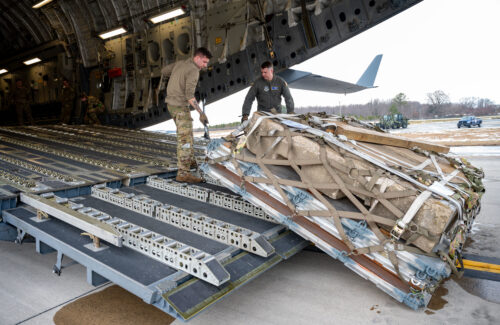The 3rd Airlift Squadron (AS) of the 436th Airlift Wing has successfully concluded trials of a novel C-17 Globemaster III combat offload procedure dubbed “Method C,” marking a potential leap forward in cargo delivery efficiency and safety. This innovative technique eliminates the need for traditional forklifts or other ground vehicles, utilizing a system of rollers and conveyor belts to safely transfer palletized cargo from the aircraft directly to the ground.

Prioritizing safety, Method C significantly reduces the drop height of cargo pallets compared to the standard offload method. This minimizes the risk of damage to sensitive equipment or supplies, a crucial concern for military operations. Additionally, the system enhances safety for ground personnel by eliminating the need for them to operate near the aft ramp during offload, a potential hazard zone.
Beyond safety, Method C boasts impressive operational efficiency gains. Compared to the standard method, which requires a minimum runway clearance of 1,000 feet, successful trials demonstrated cargo delivery within just 300 feet. This translates to faster offload times, quicker mission turnaround, and greater operational flexibility, particularly in space-constrained environments.
This opens doors to previously deemed infeasible missions. Method C’s reduced footprint allows for cargo delivery in areas with limited infrastructure, such as austere landing zones or disaster relief sites. This expands the C-17’s operational capabilities and adaptability, offering valuable strategic advantages.
While the trials proved successful, formal approval is still pending before widespread implementation. Potential challenges lie in integrating the new method with existing procedures, requiring adjustments to training, logistics, and operational protocols. Additionally, equipping C-17s with the necessary infrastructure might require additional resources and investment. Finally, the system’s effectiveness could be impacted by adverse weather conditions.
Despite these challenges, the potential benefits of Method C are undeniable. If successfully implemented, this innovative approach could revolutionize C-17 cargo delivery, prioritizing safety, efficiency, and mission adaptability. The 3rd AS’s pioneering efforts pave the way for a future where faster, safer, and more flexible cargo delivery empowers the Air Force to execute critical missions more effectively across diverse operational environments.
For more information, hit the Source below
Method C can be sold to fellow C-17 users in the FMS Train. Congress should provide funding for incorporating Method C to all USAF C-17s and options for FMS C-17 users to incorporate Method C in their C-17s.